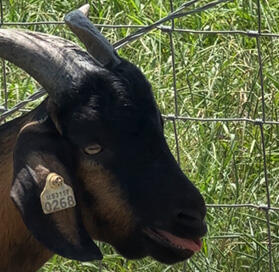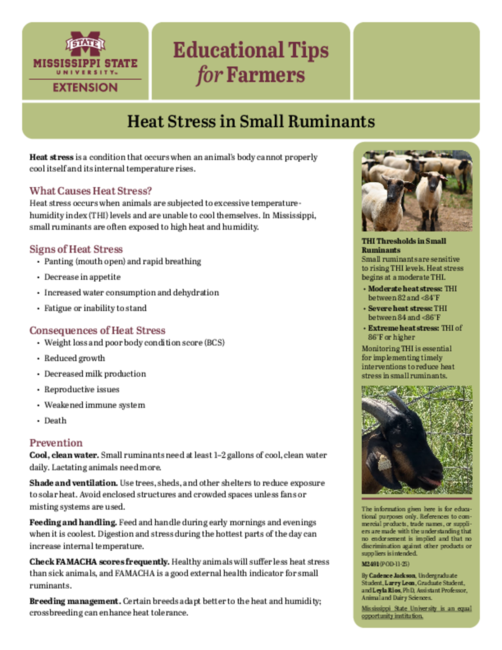M2491
Educational Tips for Farmers: Heat Stress in Small Ruminants

Heat stress is a condition that occurs when an animal’s body cannot properly cool itself and its internal temperature rises.
What Causes Heat Stress?
Heat stress occurs when animals are subjected to excessive temperature-humidity index (THI) levels and are unable to cool themselves. In Mississippi, small ruminants are often exposed to high heat and humidity.
Signs of Heat Stress
- Panting (mouth open) and rapid breathing
- Decrease in appetite
- Increased water consumption and dehydration
- Fatigue or inability to stand
Consequences of Heat Stress
- Weight loss and poor body condition score (BCS)
- Reduced growth
- Decreased milk production
- Reproductive issues
- Weakened immune system
- Death
Prevention
Cool, clean water. Small ruminants need at least 1–2 gallons of cool, clean water daily. Lactating animals need more.
Shade and ventilation. Use trees, sheds, and other shelters to reduce exposure to solar heat. Avoid enclosed structures and crowded spaces unless fans or misting systems are used.
Feeding and handling. Feed and handle during early mornings and evenings when it is coolest. Digestion and stress during the hottest parts of the day can increase internal temperature.
Check FAMACHA scores frequently. Healthy animals will suffer less heat stress than sick animals, and FAMACHA is a good external health indicator for small ruminants.
Breeding management. Certain breeds adapt better to the heat and humidity; crossbreeding can enhance heat tolerance.
THI Thresholds in Small Ruminants
Small ruminants are sensitive to rising THI levels. Heat stress begins at a moderate THI.
- Moderate heat stress: THI between 82 and <84°F
- Severe heat stress: THI between 84 and <86°F
- Extreme heat stress: THI of 86°F or higher
Monitoring THI is essential for implementing timely interventions to reduce heat stress in small ruminants.
The information given here is for educational purposes only. References to commercial products, trade names, or suppliers are made with the understanding that no endorsement is implied and that no discrimination against other products or suppliers is intended.
M2491 (POD-11-25)
By Cadence Jackson, Undergraduate Student, Larry Leon, Graduate Student, and Leyla Rios, PhD, Assistant Professor, Animal and Dairy Sciences.
The Mississippi State University Extension Service is working to ensure all web content is accessible to all users. If you need assistance accessing any of our content, please email the webteam or call 662-325-2262.
Authors
-
 Assistant Professor
Assistant Professor- Animal & Dairy Science
